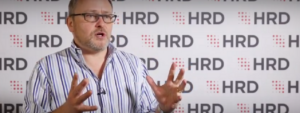The art of people at Shakespeare's Globe
- 9 Min Read
Diversity and inclusion is extremely topical right now – but shouldn’t it always be topical, be it the past, present or future? According to a recent Deloitte report, 69% of executives deem diversity and inclusion a very important issue, as opposed to 59% back in 2014. Shakespeare’s Globe, one of the most quintessentially British establishments in existence detail why diversity and inclusion is high on their people agenda, and the vital importance of why it always will be.
- Author: Emily Sexton-Brown
- Date published: Mar 27, 2018
- Categories

Diversity and inclusion is an ever-expanding area within HR. According to the CIPD an effective diversity and inclusion strategy goes beyond legal compliance and seeks to add value to an organisation, contributing to employee well-being and engagement.
Andrew Lawson, Head of HR at Shakespeare’s Globe talks exclusively to HRD Connect about the diversity and inclusion in existence at the Globe ensuring they foster a culture as rich as their heritage.
What does diversity and inclusion look like at Shakespeare’s Globe?
This is a pertinent question for us, as we’re imminently launching the first integration of our Diversity and Inclusion position paper and long-term strategy.
“Along with many of our compatriot organisations we’ll shortly be publishing our Gender Pay Gap and commenting on how we work toward reducing it.”
Our audiences, which includes theatre patrons, students, children and tourists come from all over London, the UK and indeed from around the world. Whilst we have a strong tradition of embracing and celebrating diversity through our theatre casting and creative work, we’ve been less successful in nurturing workplace diversity.
Our two theatres are probably the best known ‘public face’ of our work, but something less known is that we have a significant education department and a very busy exhibition and tour.
These sit broadly within the arts and culture space and along with many other arts organisations, whilst we can be proud of our gender diversity – we have work to do, in order to create a workforce that is truly representative of the population of our local borough of Southwark and indeed, Greater London.

The reasons for a lack of diversity within the sector are complex and long-standing so we need to develop our own strategy with specific focuses both long and short-term once we’ve identified what our priorities and realistic targets should be. These are being informed by our first detailed diversity survey – which will we hope will enable us to identify the current make-up of our work-force and then identify under-represented groups.
We’ve decided to focus not just on diversity – which is more a measure that enables us to identify which groups are currently under-represented; we’re also aiming to engender an inclusive culture which we feel is key to a sustainable approach to workforce diversity. Just being able to define diversity in a way that is meaningful for everyone – is challenging.
“We need to see how we can use technology to increase reach and engagement and encourage managers and leaders to ensure that all of our teams feel involved and included at every stage of employment.”
Diversity could encapsulate gender, ethnic group, sexuality, faith, disability, neurodiversity, socio-economic background and even personality – but opinions vary widely.
Do you have any big success-stories to share?
Since 2016 we have improved access for deaf, disabled and neurodivergent patrons. We made a new pledge to have British Sign Language (BSL) interpreted, audio-described, captioned and relaxed performances for any show with a run of over four weeks in the Globe Theatre. In the Sam Wanamaker Playhouse, we have committed to captioned, audio described and relaxed performances for all productions, and have trialed BSL interpreted performances.
Members of our access scheme who identify as neurodivergent have quadrupled in the past year, alongside a notable increase in the number of deaf and disabled actors we employ. We are now actively encouraging those with learning difficulties (such as dyslexia) to explain their requirements to us. After a series of training programmes, we now have dedicated ‘Access Ambassadors’ in the steward body to take care of the needs of our access patrons, alongside our regular ‘Access Users Group’ and the new internal ‘Access Working Group’. Globe Education have been expanding their work in Southwark, part of which has included training and developing work for people living with dementia.
We have appointed an Access Manager and, thanks to money donated by ICAP, are investing in several projects to improve physical and cognitive access to our sites and works. Among these are Bluetooth-enabled navigation systems for visually impaired people, SIGNLY BSL signage in our public spaces and the creation of a sonic map of our spaces. This has also helped support a collection of video synopses of Shakespeare’s plays, giving deaf patrons, students and teachers (as well as those learning BSL) an introduction to each of the texts in a way which understands the culture and nature of BSL.
We are committed to diversifying our pool of volunteers by, for example, recruiting from local community groups in Southwark and we are looking to expand volunteer opportunities to people with additional needs. We assist with the economic needs of volunteers by subsidising travel expenses and offer subsistence to those who volunteer their time over long hours. We also work flexibly with our volunteers to help those with family and caring commitments. We have been awarded a Certificate of Good Practice from Community Southwark following a review of our volunteer program against the London Volunteer Management Charter. We scored ‘good’ or ‘excellent’ in every category.
“Members of our access scheme who identify as neurodivergent have quadrupled in the past year, alongside a notable increase in the number of deaf and disabled actors we employ.”
On our stages the Wonder Season in 2016 achieved unprecedented on-stage diversity with 47% female, 37% BAME and 4% deaf and disabled actors. In context, for female representation this is well ahead of the industry average at 38% and only just behind the best industry performers at 48%. The Wonder Noir season in the Sam Wanamaker Playhouse was the first time we had an entire season that was directed by women (with the exception of the returning All the Angels).
In September 2017 we launched our first apprentice programme – targeting young NEET participants from local boroughs who without the scheme might never have been able to access a start to a career in the arts. We’ve had support from ICAP to fund the programme and have used our apprentice levy to fund the learning. It’s a unique model – a pathways co-ordinator supports the learners and provides a link with the college (Lewisham Southwark College) and each learner has a work-place mentor who have been trained to offer additional support outside the line manager.
So far, we’re very pleased with the way the programme is working, and we’re been nominated for Apprentice Employer of The Year and one of our apprentices has been nominated for apprentice of the year. We’ve had a powerful start and we’re hoping that we can keep this going.
How do you foster an environment that includes everyone – can this be challenging?
We want to create an inclusive culture in which our people, including our permanent and temporary staff, creative teams, freelancers and volunteers all feel valued and can be true to themselves and that their voices can be heard.
We started to gather people’s feedback about our culture and the way that people feel about working at the Globe in January 2017. This was a two-day listening event, and more recently we held a series of diversity and inclusion labs (among other subjects) we asked people what made them feel included at The Globe, we also asked them what made them feel excluded. We haven’t yet completed this piece of work; however, we absolutely recognise the importance of internal communication, work environment and of course, leadership behaviour within driving an inclusive culture.
We’re embarking on the development of a value-set over the next 6 months and we aim to ensure that the drivers of inclusive culture are captured in the common language that we develop.
What are the biggest challenges in this area?
We’re learning how important internal communication channels are in creating inclusivity and we’re reviewing and implementing changes to the approach we take but its challenging given the wide array of working patterns, working practices and employment types. For example, not everyone has an email address which allows access to our intranet. We need to see how we can use technology to increase reach and engagement and encourage managers and leaders to ensure that all of our teams feel involved and included at every stage of employment. We won’t solve this challenge overnight but we’re seeing what we can do.
What are your up and coming projects within diversity and inclusion?
We’ve become a strategic partner with PIPA (Parents and Carers in the Performing Arts) to develop strategy, policy and experiment with different ways of working to enable working parents to take part in casting and theatre practice. Again, there are no simple answers, but we have great ambition to develop more inclusive working practices.
Along with many of our peer (replace compatriot) organisations we’ll shortly be publishing our Gender Pay Gap and commenting on how we work toward reducing it. Many of the activities that we’ll be announcing will form a core element of our people strategy over the coming two years.
We’ll be launching our diversity and inclusion strategy in the coming weeks which will define our current position but also set in place our ambition and goals. From a learning perspective we’re developing an approach to tackling unconscious bias – but wanting it to be sustainable and long-term – so its not just a chalk and talk piece of delivery.
We’re just about to extend and expand our work experience and work placement programmes – to ensure that we’re offering accessible opportunities to a more diverse cross-section of our community who might never have considered the arts but whom we want to engage with as diverse talent of the future.
What do you think is the biggest misunderstanding around diversity and inclusion in the workplace?
That it’s an HR-lead initiative.
It can never be sustainable unless it becomes embedded through every aspect of the organisation and has significant leadership support and priority. Otherwise it just becomes another tick-box as part of a CSR programme – because it feels like it’s the right thing to do, and then becomes more about targets and quotas rather than a part of organisational culture.






